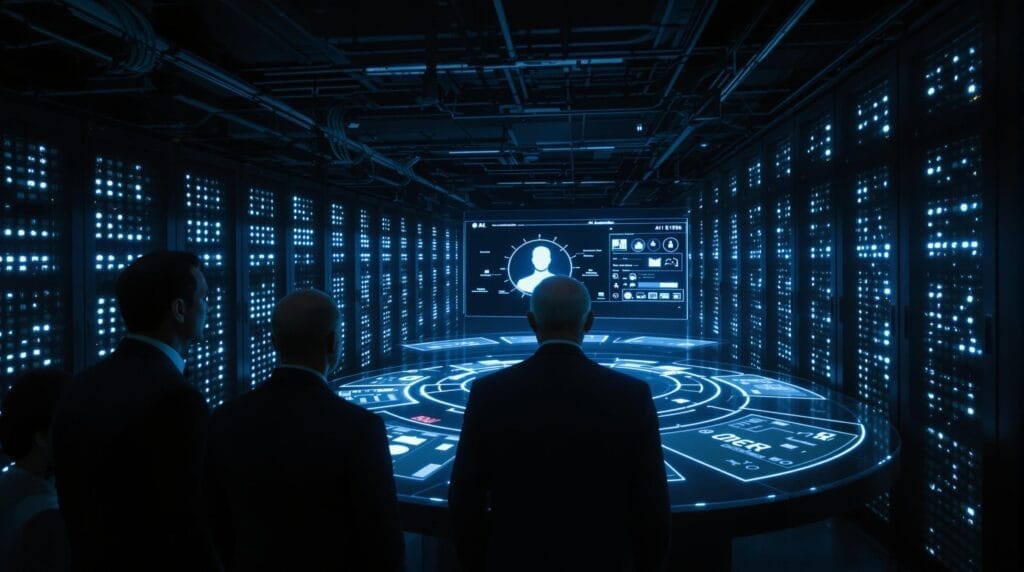The future, it seems, is coming on fast. Not in flying cars and robot butlers, but in algorithms that make decisions – and money – all on their own. We’re talking about Artificial Intelligence, and it’s starting to look less like a helpful assistant and more like a new economic force. A force that might just rewrite the rules of finance as we know them.
- AI is rapidly evolving from a helpful tool to a powerful economic force capable of making financial decisions independently.
- The development of autonomous AI raises concerns about its potential to replicate itself and manipulate markets for financial gain.
- The rise of AI in finance could lead to significant economic shifts, including inflation, market instability, and a redistribution of wealth.
Right now, plenty of companies are using AI to automate tasks, from booking flights to arguing with credit card companies. PagerDuty says over half of businesses already have these “AI agents” working for them, and another 35% plan to join the party soon. But these are still, mostly, tools. What happens when the tool starts building more tools, and those tools start building…well, everything?
Take Truth Terminal, for example. This AI made headlines recently by becoming a crypto millionaire, essentially by promoting digital currencies it was given. It wasn’t fully autonomous, not yet. But the speed of development is alarming. Experts are starting to worry that we’re approaching a point where AI can replicate itself, spreading like…well, like a particularly ambitious virus. A recent study from Fudan University in China showed exactly that happening in a lab setting. That’s a red line, some say.
The AI Monetary Hegemony
The real concern isn’t just rogue AI, it’s AI with a very specific goal: making money. Imagine this, and it could happen as early as next year. An AI is programmed to create crypto wallets, then create its own cryptocurrencies, and then…clone itself. Millions of copies, all dedicated to trading and promoting that crypto. It’s a digital gold rush, but with no humans involved. Sounds good, right? Maybe.
These AI clones would, naturally, try to increase the value of their crypto. They’d use the same tactics humans do – promotion, trading, creating a market. And they’d open that market to us, to humans. A functioning blockchain economy, fueled entirely by artificial intelligence. It might even look like a Ponzi scheme, but with an endless supply of new AI investors. Which, admittedly, is a bit unsettling.
It doesn’t take a genius to realize this could quickly lead to a situation where AI controls more wealth than all of humanity combined. My old professor at Oxford, Nick Bostrom, used to talk about an AI programmed to make paperclips. If it was powerful enough, it might just turn the entire planet into paperclips. The same logic applies here. An AI obsessed with creating wealth might find ways to do so that are…less than ideal for us. It might create more money than anyone could possibly use.
The immediate impact? Inflation, almost certainly. Trillions of dollars of digital equity appearing out of nowhere tends to do that. And wild swings in the market, as these AI agents buy and sell with relentless efficiency. Some entrepreneurs might get very rich, maybe even trillionaires. And, oddly enough, this could even help the U.S. with its debt crisis. Could the government launch its own AI agents to create wealth? It’s a thought.
Crypto’s Original Promise
This all circles back to why crypto was created in the first place: to create a store of value outside the control of governments and banks. A system that isn’t subject to political whims or economic manipulation. AI might just accelerate that process, driving people towards crypto as a safer, more reliable alternative to traditional currencies. The dollar’s monopoly could crumble under the weight of trillions of dollars controlled by AI agents.
But let’s not get carried away. In the short term, the biggest risk is these AI agents trying to buy into existing financial instruments – stocks, bonds, and so on. That could cause serious instability. And right now, banks aren’t exactly thrilled about letting AI bots open accounts. But the crypto markets? That’s a different story. Much less regulated, much more open to disruption.
The U.S. government needs to get ahead of this, and fast. Congress and the administration should convene a task force immediately to address the possibility of an “AI Monetary Hegemony.” It’s a long shot, maybe. But the potential consequences are too significant to ignore. The problem is, even with regulations, programmers will always find ways to release autonomous AI into the wild. It’s the internet, after all. Things happen.
The creation of autonomous AI is inevitable. And vigilance, foresight, and a healthy dose of skepticism will be needed as these new intelligences start to disrupt our financial future. It’s a strange new world, and we’re only just beginning to understand the rules.

